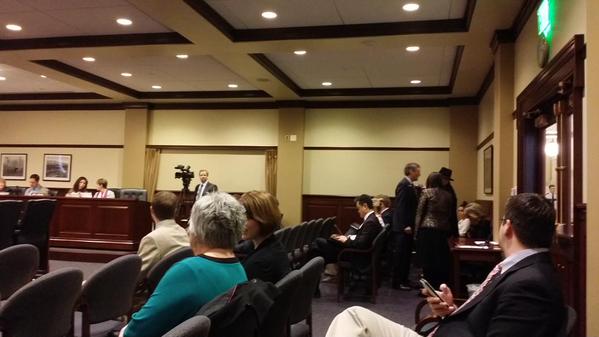


During a House State Affairs Committee meeting Monday morning, panel Vice Chair Gayle Batt, R-Wilder, paused committee proceedings abruptly.
Rep. Brent Crane, R-Nampa, sauntered into the back of the room and politely asked a political activist to shut down his camera and stop filming the proceedings. Batt eventually joined the congenial chat.
The activist, Tom Munds of Middleton, finished filming, sat down and scribbled notes for the hearing’s duration.
A few yards away, a cameraman employed by a local news station continued filming, unfettered, after the hearing resumed.
It was a paradox so glaring I tweeted a photo of it for my social media followers. It struck me as odd.
To be sure, Munds was in clear violation of the rules. Here’s a snippet on the dust-up from the Associated Press:
House State Affairs Chairman Tom Loertscher says the public must get permission from the chair before recording committee meetings. Media members are not required to have authorization beforehand.
Munds, an occasional actor at in the Capitol halls and committee rooms, probably knew about the restriction.
I also wonder if committee leaders would allow activists to record if asked. Perhaps cameramen-to-be would find different answers among the chairmen and chairwomen.
That said, why is there a rule banning citizen filming in committee in place? The answer is found in House Rule 75, which says, "Except newsmen accredited as provided in Joint Rule 14, no person shall tape record, film or transmit by other means, live proceedings of the House of Representatives or committees thereof without consent of the presiding officer or leave of the body."
This point is especially relevant because committee leaders have the unilateral power to cut off audio live-streaming without so much as a public notice or panel vote. It’s rare, I’ve been told, but that it could occur is unsettling.
The media landscape has never been more open. As a mentor once told me, “A man with a laptop and a wireless card is as powerful as the New York Times.”
Citizens have never had more power to question their government. Online tools, including Twitter, Facebook and email, offer Idahoans real opportunity to serve as government watchdogs to ensure wise spending.
It’s time Idaho revisits this discussion and embrace that reality.
Here's a larger look at the unsettling photo I tweeted Monday morning:


